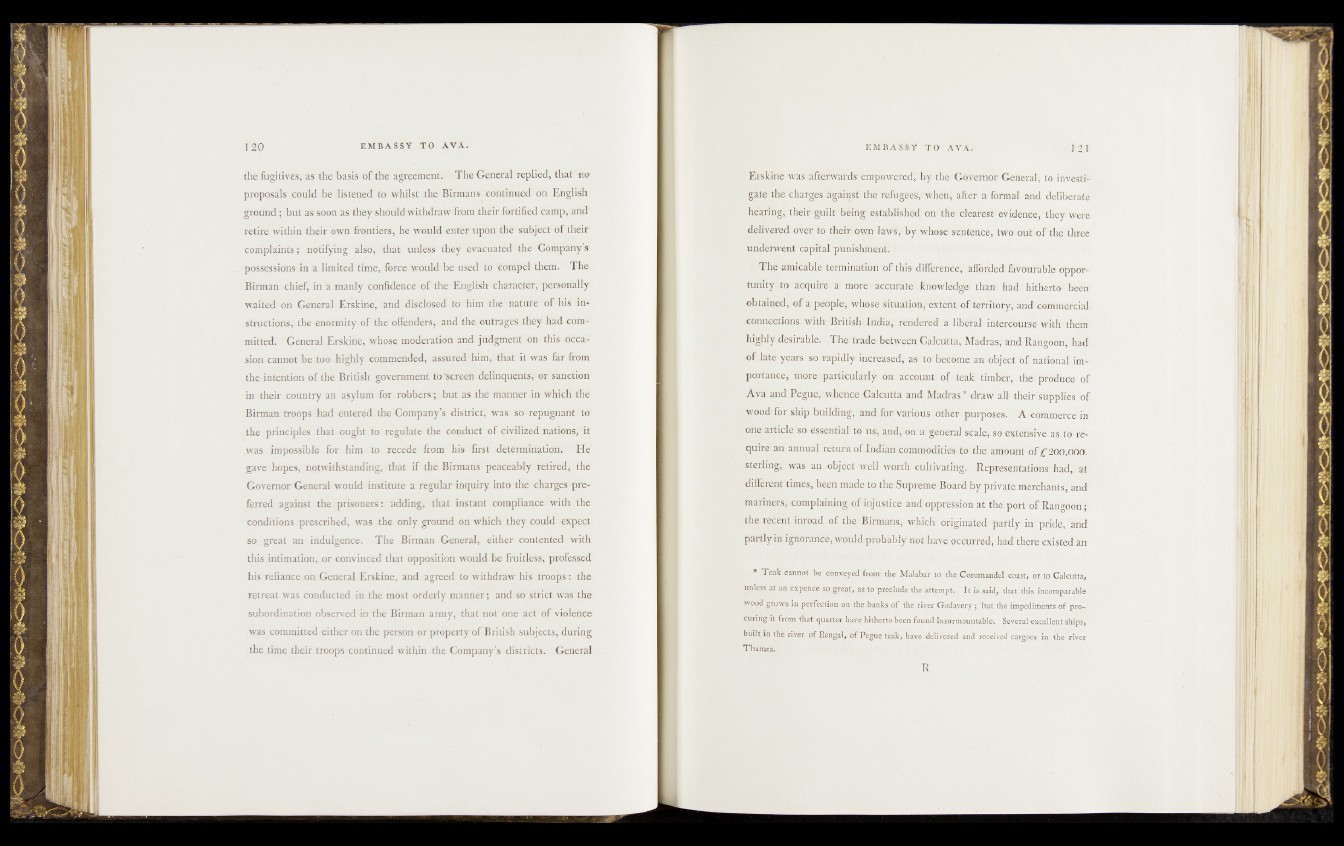
the'sfugitives,. as'fihe basfe^oflthe agreement): ,pTke General replied; that' tia
proposals could be listened to whilst the Birmans ~confinued' on English'
ground; but as soon as’they should withdraw from their fortified camp, and'
retire within their own-frontiers, he would enter-upon- the sli&ject'bf their
complaints; notifying also, that unless they evacuated the Company’s
possessions in a limited time,- force would be used to compfhthem. The
Birman-chief, in a manly confidence of the English character, personally
w a ite d p n (Seneral Erskine, -and disclosed to him the >' nature- ' ©Phi's in-
. structionsi'the enormity- of'-the offenders,- and the outrages,.they had- cairn'
mitted. General Erskine, whose moderation and judgment on this occasion
cannot be too highly commended, assured him, that if-was fa’r from
the' intentitHx of the British government to'Screen delinquents** or <shnctiorf
in their-country an asylum for robbers; but as:thd^fhMhhr^in
Birman troops had entered the Company’s district, was ^so^repugnant'-'#•
the principles that-ought to regulate the conduct ©f “civilized nations;-it
was impossible for . him - to recede -from his first determination. He
gave hopes, notwithstanding, that if the Birmans peaceably retired, the
Governor General would institute a regular inquiry int6 thfe«cKafgd^ preferred
against the prisoners: adding, that instant compliatfde'with the
conditions prescribed, was the only ground on which they could’expect'
so great an indulgence. The Birman-General, either contented with
this intimation,.of convinced that opposition would be fruitless, professed
his reliance on General Erskine, and agreed to withdraw his. troops : the
retreat was conducted in the most orderly manner; and so strict was the
subordination observed in the Birman army, that not one act of violence
was committed either on the person or property of British subjects, during
.the time their troops continued within the Company’s districts. General
Ei'ski|0Vas’&ftêMfedfe^è'r^p%w‘êVe^îl^th^*Glyéwlf^®fefî-êràh to itiv’estfc
’gatcnhc thiiG:(.s\il.ïffist;tlli^rcl'iigcès^hVaiï;,S('Scî^j'’f()riîuI and ddibei iter
hearing, tfeei#|&ilti bèin^sSi^Mishedj orfBfcl’^liekFqSt.' > efàdêntëéÿfl®)? were*
d'èMiCpred oVerrt'o bheirlpwn faws';;by.w host-'seftftihce, t\f o^olit-oB the thiee
,-U 'd d 'é r ^ e n ^ a p ^ ^m M ih n ïeU t? ->d
The*auudiblcitcrfiiiiuik®n>of this a’ftbrclfcdffil ouf.iblc'o’ppor-'
lfutflt\jito1 Æcqftiïc ell more»« amihtb0ifdw 1uIl,cS th'.u'P liad"hûjiLiï(^ Been»
obtained, of a peoplepv 1jos'dJs]tti<ï*ti< 11rftï îil»C&n i tor) ; andlcoritineici'a®
^©mweètionsiwith -BritiSlfe India1;’ félÇf^M*'â^l5^^Sl'Ciloe'ie^StS§,with<- them’
highl\ dtstïalîle'.’HÏ lie» tr add bdtwocnrCùft utt rpM îdrus Vnd^UanVftc&tfhad
-,ofi late’-yearp g’otf.a-pidlyi increased; oh eeî^offn'îfîfin 11 nn-:
■ jportafece, morév particularly, on ^ îm r ô f f t e â ^ t É S ^ fclÉlÇtot&'â o f
A \a and liegue.'whence Calcutta and Madias* (Ji,n\~iàlf-tlieu-'si^*liiL^'df
v^owd-for. ship budding,1 and f©n\tnioiisw>the^}pufpose? ^ A co’Snihè’fùYin'
©net.u lu le so essential to us', and; onra«gcnual ^ d^ .s^ ev lc ffsh c ‘ is^M 1 é-
quire'.m annual rctumof Indian c ommoditiesïtifrthtiîumfîunl ol'f^&&,(ÎO&!,
was tfi&objecWwelf wortfâfckitiVâtingy'^Rcprîkêhta'tiùns'’ Had, -a’P‘
different tifmèsçibeen made to thfarSufifcnSe Bo u d fiÿpi i\ ifc-riicfLh iflf s, arid!
mariners, .complaining ol injustice anH*oppiossinfi4)i'tMport o^Rarigbôïî^
thq^e^tiùnroad bffith#£Bimians, prfd'd,^ahd
partis'ift ignorance, svould’pnobahfj notih ive-ot cuticd; ha’dfthercV^is ftfda'n
* Teak cannot be conveyed fipm: the Malabar -^Aj^B^.?nan;de^'coa^j;or,toe€'alcut.ta,
,t1cl)en1ce °° g n f 'i a«- to .,tijj$,sud, tMwrtnsi.mc.ompar hie
wood grows in perfection on the banks of the i er Godavery ; but the impediments of procuring
it from that quarter have hitherto been foun 1 insurmountable % Several excellent ships,
built in the river of Bengal, of Pegue teak, have delivered and re eived cargoes in tfic ru r
Thames^
R